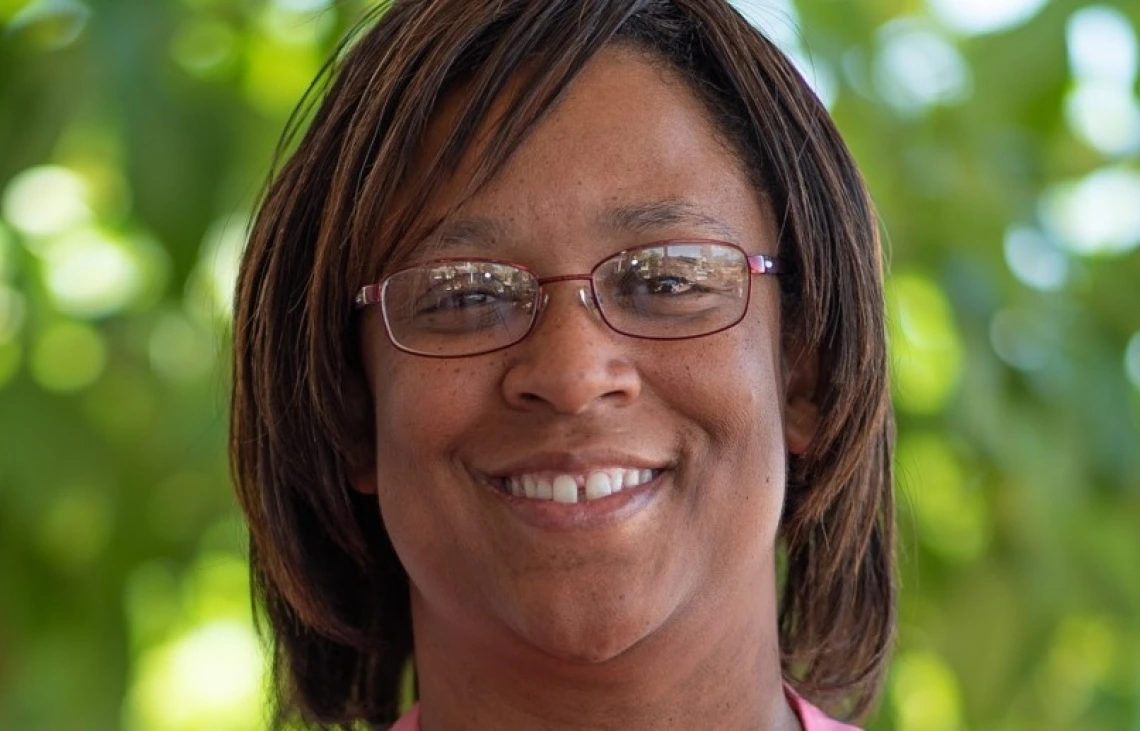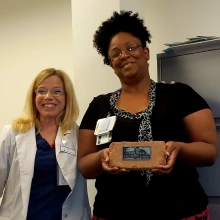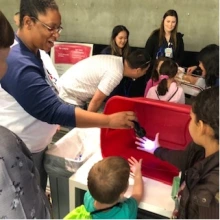Faculty Spotlight: Jocelyn Nelms Reflects on her Career and the State of Equity, Diversity and Inclusion in Nursing Education

In a national moment when racism has finally been recognized as a public health crisis, engaging in dialogue about ways to address issues of inequality in health care professions is essential. Since colleges are at the forefront of providing training that can help eliminate disparities related to a patient’s race or ethnicity it’s especially important to highlight the achievements of educators with an understanding of those goals.
In recognition of Black History Month, we reached out to University of Arizona Nursing faculty member and alumnus Jocelyn Nelms, MS, NEd, RN to hear about her career as well as her thoughts on the topic of equity, diversity and inclusion. A nurse for over 20 years and a nurse educator for over 13 years, Nelms earned her Masters of Science degree in Nursing with an emphasis in Nursing Education in 2009. Since then, she has become well-known for her passion for patient education and teaching the next generation of nurses -- including classroom, simulation, skills labs and clinical practicum. She has presented at local, national, and international conferences in Nursing and simulation education. She serves as course chair as well as a committee chair and is a member of the Arizona Simulation Network and the American Association of Critical Care Nurses. In addition she has achieved honors including UArizona Nursing’s Old Main Brick Award for faculty excellence, and was a nominee for the Athena Valley of the Sun’s Honoring Athena Inspired Leaders Award for amazing Arizona women making a difference in our communities.
“I know that one interaction can make a patient, family or community feel valued. I also know that if policies do not change, if resources are not provided, if awareness is not extended to action, then we will continue to see inequities in our ethnic communities and communities with poor socioeconomic status," ~ Jocelyn Nelms, MS, NEd, RN
Like many in the nursing profession, Nelms came to her passion at a young age. Although her father initially discouraged her from pursuing nursing because of the hurdles his mother and aunt faced in the profession, she took inspiration from her grandmother’s career. That experience included acting as a Labor & Delivery Nurse, a Community Health Nurse and general medical surgical nurse. While she worked in a variety of health care settings as a Licensed Practical Nurse and was looked up to by her community, barriers and limited resources prevented her from obtaining a Registered Nurse license. “I saw her as a positive role model, however, and I wanted to go further than she was able to,” Nelms says. “I made up my mind to pursue my Bachelor of Science in nursing and become one of the first people in my family to start and finish at a University and obtain my degree.”

Jocelyn Nelms receives the Old Main Brick Award
As a UArizona Nursing student, Nelms was one of the few ethnic minority students in the cohort. She engaged with fellow students from various backgrounds and nationalities and built long-lasting friendships. At the same time, she lacked peers she could identify with and sometimes had to go outside the college for student support services. She credits faculty like Marylyn McEwen for making her feel heard and included. “These teachers assisted us in understanding that it was our job to reflect on those feelings, assess what is needed, and advocate for ourselves and our patients to obtain the resources that were necessary,” she says.
Nelms’ greatest role model is her father. A hardworking man dedicated to his family and his community, he faced challenges in his pursuit of higher education but overcame them to eventually earn his Associate’s degree and Bachelor’s degree. “He taught me to set goals, determine the path that you want to take to get there, create a plan B because barriers and road blocks will occur,” Nelms says. “Without my father encouraging me to study, being a sounding board when things got tough in college and reminding me of the goals that I had set, I am not sure I would have made it through nursing school.”

Jocelyn Nelms at Connect 2 STEM
Nelms’ path to her current profession began in her study groups in the University of Arizona College of Medicine library. Fellow students said she should consider becoming a nursing instructor because of her talent for guiding them toward success on exams. “This planted the seed in me to purse nursing education,” she says. She went on to obtain her Master of Science in Nursing with an emphasis on nursing education and once the opportunity presented itself she started teaching. “That’s still the best part of my job: when you can explain something to a student, especially when in a clinical rotation, and they get it and the ‘light-bulb' comes on.”
Despite the joy she gets from her work, Nelms is acutely aware of the inequalities that underpin society, especially in health care. “Racism, overt and covert, has permeated all areas of our society,” she says. “It is hard to see at times that your thoughts and concerns are not appreciated or listened to, or taken seriously all because of the color of your skin. This means that sometimes health care providers, loan officers, etc., might not explain things fully, omit important things, be afraid to care for people in certain areas leading to inappropriate or poor care, and decreased resources.” She stresses the importance of acknowledging racism and confronting the wounds and injustices of our past. Otherwise, she says, “We’ll keep ripping scabs every time ‘something’ happens. At some point, scars will be left as a reminder of the ‘healing’ that never happened.”
Nelms sees some improvements in classroom settings, although she stresses that social justice issues should be expanded to more than just Community Health courses. “One class might help address the existence of bias in relation to how we care for others, but more should be done. I appreciate the recognition of the problem but we often fall short of creating actual, sustainable change.” Change on a larger scale, she says, will take big alterations on a community and public policy level. “I know that one interaction can make a patient, family or community feel valued. I also know that if policies do not change, if resources are not provided, if awareness is not extended to action, then we will continue to see inequities in our ethnic communities and communities with poor socioeconomic status.”
The path toward improvement begins with acknowledging the existence of disparities, Nelms says. We must assess for health literacy, offer free classes where financially challenged community members can consult with health care providers, provide funding for follow-up visits and updated surveys to address cultural needs. She also believes it is extremely important for patients to see themselves in their health care providers as members of their community. “It can make a patient more adherent to recommended treatments, make a person feel more valued and cared for and make a person feel part of society at large,” she says.
For students of color who are considering a career in nursing, she is quick to offer encouragement. “I would remind them that the majority of their peers do not understand where they’ve come from or the amount of work it took to get here. If it was easy for you, then you’re privileged, and you owe no apology for that. If it was difficult, you made it, but more challenge lies ahead. Though you may have worked harder to get here, nobody owes you anything. You are not alone, though. Find a Mentor because racism exists within healthcare and yes, within nursing.”

